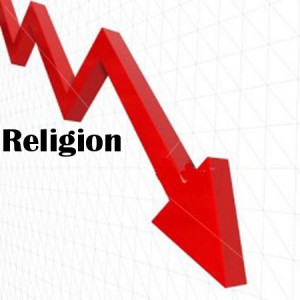The State of Religion: Declining Belief in God Worldwide

By Brian Magee
Two recent studies released almost simultaneously provide more hard evidence that religion is slowly losing its grip on humanity, even in the United States.
First, a report from the University of Chicago called “Belief About God Across Time and Countries” looked at survey data from 30 countries, reaching as far back as 1991. While many of the news stories about this report focused on figures showing a tendency for numbers of religious believers to increase with age, the figures also showed the overall percentage of religious believers declined in most countries, showing an increase in only three:
“…the % saying they were atheists increased in 15 of 18 countries from 1991 to 2008 with an average increase of 1.7 percentage points. For 1998 to 2008, atheists grew in 23 of 30 countries for an average gain of 2.3 points. Conversely … certain belief in God declined in 14 of 18 countries from 1991 to 2008 with an average decrease of 2.4 points and from 1998 to 2008 loses occurred in 24 of 30 countries for a similar average decline of 2.4 points. Likewise … never believing in God rose in 14 of 17 countries from 1991 to 2008 for an average increase of 1.6 points and increased in 20 of 29 countries from 1998 to 2008 by an average gain of 2.2 points.”
Second, a study called “The State of the Bible 2012” done by the Barna Group for the American Bible Society found that Americans are losing interest in the Bible. In just one year, the number of people who said they read the Bible to be “closer to God” dropped 9 percentage points from 64% in 2011 to 55% in 2012. Results show a drop from 75% to 69% of people who said “the Bible contains everything a person needs to know to live a meaningful life.” Those people who agreed that the Bible has “too much influence” in U.S. society increased from 13% to 16%, while those who thought the Bible had “too little influence” dropped from 54% to 47%.
While these figures are only for the span of a single year, the changes indicated are not small for such a short period of time. Additional surveys will need to be done to show a permanent trend, but other recent studies have given us similar results. For example, the ongoing State of the States survey by Gallup found in 2011 that 40% of Americans are “very religious,” down from 65% in 2008. And new research on the Millennials—those between the ages of 18 and 29—show a 20 percent decline from those who were raised Christians and now no longer consider themselves such.
What’s happening here? Because results of surveys like these show a great deal of variation based on age and geography, reasons to explain overall trends will be varied. But the results raise some interesting possibilities to consider, including something as simple as bad behavior, hypocrisy, and outlandish assertions on the part of those who claim most publicly and proudly to be religious believers. The areas that those who claim to be religious fail to shine include child abuse scandals, open LGBT discrimination and support for bullying, attacks on women’s rights, support for war, pushing for religion in science classrooms, prayer-led public meetings, denying the separation of church and state, withholding medical care in favor of prayer for children … and the list goes on.
Religious-based bad behavior is not limited to the U.S., of course. We’ve been witnessing a worldwide phenomenon of bad behavior coming from adherents of all of the world’s major religions. Everything from death for blasphemy to claims of seeing religious figures in everyday objects only ads to a growing worldwide skepticism about religion as a valid framework for humanity to consider. Cases of bad political and criminal behavior from people who are aligned with those in religious groups are also part of the mix that drives people away from religion. The recent rants of Ted Nugent and mass murderer Anders Behring Breivik are prominent examples.
One thing’s for sure: humanists are poised to reach out to the growing number of “nones” and show humanism as the reason-based alternative to traditional religion. It’s an opportunity that all of us working for the freethought movement can’t afford to miss.
Brian Magee is the communications associate for the American Humanist Association.
